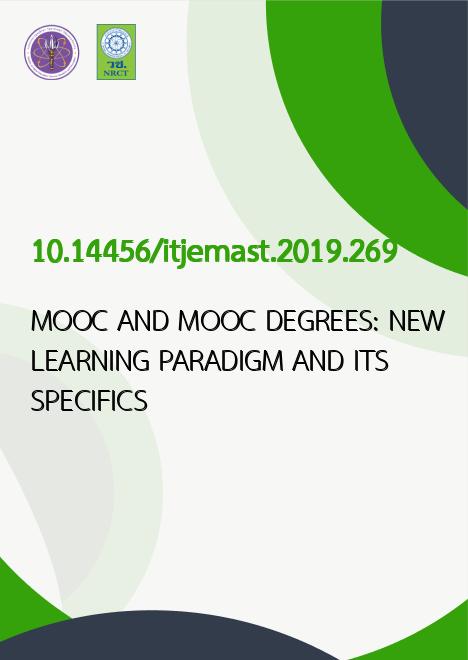
|
MOOC AND MOOC DEGREES: NEW LEARNING PARADIGM AND ITS SPECIFICS |
|---|---|
| รหัสดีโอไอ | |
| Creator | Mikhail Nikolaevich Shcherbinin, Sergei Vasilievich Kruchinin, Alexey Gennadievich Ivanov |
| Title | MOOC AND MOOC DEGREES: NEW LEARNING PARADIGM AND ITS SPECIFICS |
| Contributor | - |
| Publisher | TuEngr Group |
| Publication Year | 2562 |
| Journal Title | International Transaction Journal of Engineering, Management, & Applied Sciences & Technologies |
| Journal Vol. | 10 |
| Journal No. | 19 |
| Page no. | 10A19K: 1-14 |
| Keyword | Massive open online course, MBA, Online education, Online students, Master's degree, Bachelor's degree. |
| URL Website | http://tuengr.com/Vol10_19.html |
| Website title | ITJEMAST V10(19) 2019 @ TuEngr.com |
| ISSN | 2228-9860 |
| Abstract | Massive Open Online Courses (MOOCs) are one of the most important facets of modern education. They appeared in 2008 and are still developing. The article is dedicated to understanding the MOOCs learning paradigm, its development, and realization in the new product - MOOC degrees. MOOC degrees are full Bachelor's, Master's, or MBA programs provided by platforms such as Coursera, edX, and others. These degrees are cheaper in comparison with other online education programs by separate universities and with traditional programs. MOOC degrees are based on principles of previous courses, including auto-grading, flexibility, fully online format, and topicality. The vast majority of current programs are in the spheres of business, computer science, engineering, and data science. There is a lack of humanities and social science degrees. However, this direction of education has been implemented just recently. In the future, the number of such programs will increase and become more varied. MOOC degrees are based on the MOOC paradigm and inherit its pros and cons, but completion rates should be significantly higher. These programs can substitute online degrees by many universities and be useful, but not very affordable for students from lower-income countries. The overall quality of universities provided MOOC degrees, currently is lower than MOOCs founder members. |